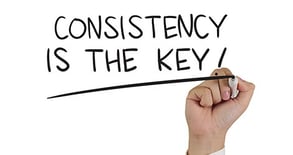Thanks very much for the comments and ideas from last week's blog post on "The (first) Five Rules". As promised, here are the remaining five. It may well be that you have your own, so let me and our readers know about your ideas by commenting below...
Five More Rules
1. Establish a Rhythm of Planning
Strategy or Business Planning Sessions are typically worthless
...unless you, as the senior management either of the company or as part of the sales planning team, subscribe to this as a consistent practice in your business.
"Consistency" is the key word here, and all of the members of the planning team should know what that means in terms of the Rhythm of the Business. Our recommendation for setting up a rhythm for planning meeting is to...
- Have one two day strategic business planning session per year. As much as possible, that particular session should be focused on looking at and discussing longer-term strategic growth opportunities over the period of the next 18-36 months.
The purpose of these well-planned, well-prepared for and well-researched meetings is to look past the next six or twelve month budget cycle and come to agreements as to what STRATEGIES (just substitute the words, "primary longer-term directions" here for "strategies" ) the senior management will pursue over the period of the next six to 36 months. As architects of the business, the purpose of these forward-looking, growth-opportunity meetings is to construct both the framework and the building out of the accompanying tactics that will result in "significant revenue and profitability growth"
At this longer two day annual planning session,, the result will be agreement to go forward on a small number of prioritized strategies ("primary directions") along with a series of "Next Steps" which have been agreed to by the planning team during the meeting. These may be "Next Steps" due to the requirements that...
- Additional research may be required
- Detailed tactical plans need to be developed
- Additional outside expertise is needed before proceeding
- Then you plan on four follow-on, one day meetings, most probably one each quarter, to come together for a day and report out on the assignments that were made and also develop further the strategies that were discussed at the prior meetings. Each of these meetings will refine what had been previously agreed to, will note the progress that had been made, and often result in more follow on tactics to be worked through for the next quarterly update meeting.
In this way, there's a rhythm of planning and the seriousness and a pattern of planning consistency becomes part of the DNA of how the company is managed and always pushed forward.
2. Pay a Lot of Attention to Logistics

There are just a few critical logistics requirements for successful planning meetings.
1. A Different Location
2. Comfortable Chairs
3. The Right Food
1. Someplace "Different"
Where you do not want to meet is the first floor of the average, local Marriott or Residence Inn with no windows. You need "something different" to stimulate interest, excitement and innovative thinking since that's the reason that you're coming together.The MIT Endicott House (we use this 90% of the time) and the Babson Executive Conference Center are our two "Best Picks" in Massachusetts. The Wentworth Hotel in Portsmouth, NH and Stratton Resort in Vermont are our two best locations outside of Massachusetts. All of these adhere to the best practices below:
2. Comfortable Chairs & Other Stuff
- No banquet hall chairs...ever!
- Superb service.
IT, AV and meeting equipment expertise plus food service - Lots of space.
Large rooms with 50% more space than there are people - The Right Food
Food choices are critical to any meeting's success. Just make sure that the food is "healthy", and absolutely eliminate any high sugar foods
- no doughnuts or any breakfast sweets
- no desserts at lunch other than fruit
- no cookies or brownies...under any conditions!
If you insist for some crazy reason on having sweets, be prepared to have some people nodding off and massive inattention in the afternoon on the part of everyone else...exactly at the time when you want total focus on decision making.
3. Create Equality in the Room
![]()
 You must be able to create "equality in the room". In a sales or business planning session, everyone is CEO or Sales Manager for that day. The purpose of these meetings is not a series of presentations or lectures by the CEO...or anyone else.
You must be able to create "equality in the room". In a sales or business planning session, everyone is CEO or Sales Manager for that day. The purpose of these meetings is not a series of presentations or lectures by the CEO...or anyone else.
All of the prep material needs to be presented prior to the meeting either with robust PPTs or using a video and voice platform such as Brainshark. In that way, everyone comes to the meeting prepared to engage, to discuss, and to argue out the very best solutions on what it will take to grow profitable revenue.
The real purpose of these meetings is to engage everyone, and nothing is worse than a CEO who not only wants to "hold the chalk", but also wants "to control" what is discussed in the room.
4, Follow "The Rule of Less is More"
In a one day meeting, at the very most, you will only have time to discuss and develop the framework of solutions to three major initiatives...and three's a big stretch.
Business, strategy and sales planning meetings are not the place to squeeze in "as long as we're together" items. The rule that you need to hold yourself accountable for is that if it is "a simple issue", then it does not belong at a business or sales planning session.
5. Achieve Total Agreement & Not Just Consensus
 Each of the members of the Planning Team must commit that they are totally bought into the decisions and/or the directions which have been reached. This means that no one can leave the meeting with comments such as...
Each of the members of the Planning Team must commit that they are totally bought into the decisions and/or the directions which have been reached. This means that no one can leave the meeting with comments such as...
"I would have brought that up, but I didn't want to upset him"
"l agreed because I wanted to move the discussion ahead, but..."
These are meetings where you and everyone on the planning team must agree. You're looking for "The Amen" since that is a full agreement of where you are going to invest your valuable time and financial resources over the period of the next 12 to 24 months in order to grow the business. If you would never settle for a "good enough" player on your management or sales team, then you should never settle for "good enough" in setting the strategic directions for your business or your sales team.
Make sure that you aim to achieve full agreement and not just consensus!
So, that's it...Five rules this week and five rules last.
Hope that this is helpful as all of us enter into the planning season, while bringing in the balance of this year's numbers. Any questions, or want to know more, just schedule a call with us.
If you want a more detailed read of what it takes to create a full business plan for either your emerging or well-established business, you can click on to the download noted to the right and get a free copy of our 100 page "Writing the Winning Business Plan". We had fun writing and editing this and hope that you will have fun reading it. Let us know what you think!
Jack's Rules:
- Plan Once,
- Check the Plan Twice.
- Work the Plan...the way you planned it.
- Questions?
- Go back and check the Plan.
Have specific business or sales planning questions that you want to bounce off me or other Derby Management Coaches (George for Finance, Bob for Entrepreneurship, Steve for Organization and Management Development, Jan for Marketing and everyone for Sales Productivity), just email me, and we'll set a time to talk at the end of your day.

Derby Management...for 25 years
-Sales & Marketing Productivity Experts
-Business & Strategy Planning Specialists
-Senior Management Coaching for CEOs & VPs
Box 171322, Boston, MA 02117
Jack's Cell: 617-504-4222

